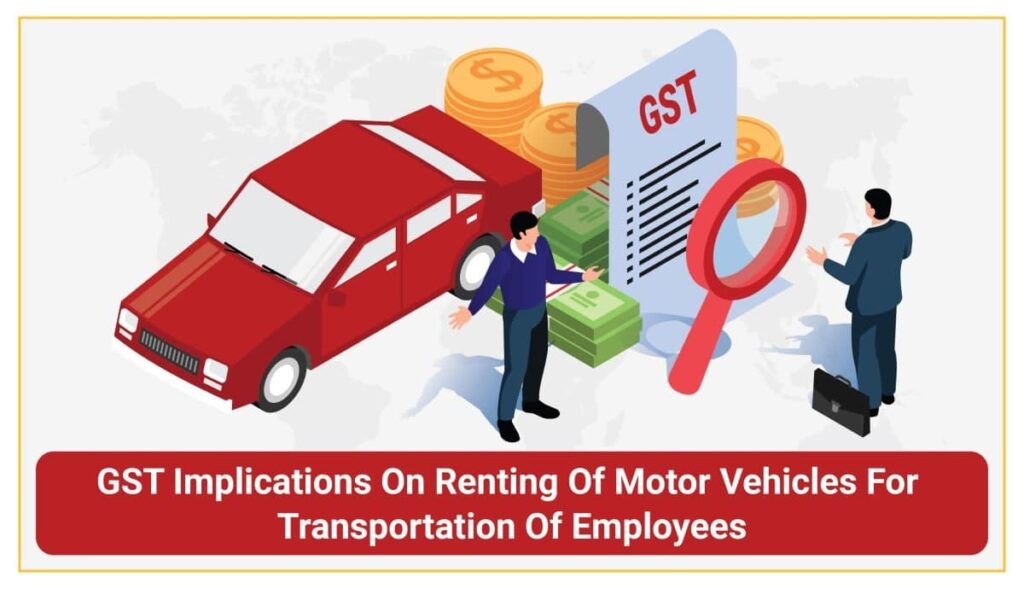The applicability of RCM on renting vehicles has helped small service providers with improved liquidity by reducing their GST compliance. Paying GST on forward charge was not possible as they received payment for their services after several months.
It was decided in the 37th GST Council Meeting to put the supply of renting of motor vehicles under RCM for suppliers paying GST at 5% to corporate bodies. But, RCM was not made applicable for suppliers paying GST at 12% with full ITC because this would have blocked the ITC chain.
Nowadays even an ordinary person knows this and often uses a taxi service. In recent years, the rental of motor vehicle services (also known as the rent-a-cab service) has increased by leaps and bounds. Implications of indirect taxes on motor vehicle rental services have always been attractive because of their complicated reduction/exemption in the earlier law. So let us discuss Reverse Charge Mechanism (RCM) for Renting Vehicles Under GST.

What is Reverse Charge Mechanism?
RCM is a broad term that covers assessees covered by Section 9(3) of the Central Goods and Services Tax (CGST) Act, 2017. Generally, the supplier of products is liable to pay GST. However, in the RCM mechanism, the customer is liable to pay GST. RCM applies automatically in case of imports and purchases from unregistered sellers. It also applies to the list of goods and services established by the Ministry of Finance according to notification No. 13/2017-CT(R) dated June 28, 2017.
“Motor Vehicle” and “Rental of Motor Vehicle” under GST
The word motor vehicle or motor vehicle hire is not defined under the GST Act. But under the Motor Vehicles Act 1988, a motor vehicle means “any mechanically propelled vehicle used on roads, but does not include a vehicle running on fixed tracks or a special vehicle used in a factory or enclosed premises with less than four powered wheels.” volume not exceeding 25 cubic centimeters.”
Motor vehicle: Government vide notification on 31 December 2019 replaced the word motor vehicle with the word “motor vehicle intended for the transport of passengers”. Previously, the term “motor vehicle” applied to all types of motor vehicles. However, the revised notification is only intended to cover “passenger-carrying vehicles”.
Thus, as per the revised notification, the RCM applies only to passenger vehicles. RCM does not apply to the hiring of trucks, JCBs, cranes, etc.
Renting of a motor vehicle: Rent of a motor vehicle means the right to use the vehicle for a certain time. Here, the essence of the service is the rental of a motor vehicle and not the transportation of passengers
Reverse charge mechanism on renting of motor vehicles
Under RCM, the receiver of service is liable to pay tax on supply. Usually, the supplier of goods is liable to GST, but under RCM, the chargeability gets reversed.
There are two GST rates used in renting motor vehicles:
With full ITC- 12%
With limited* ITC- 5%
*Limited ITC means input tax credit can be claimed only from the output liability in the same business line.
RCM is applicable on renting motor vehicles used for carrying passengers if the supplier fulfils the three conditions below:
- The supplier is other than a body corporate.
- He provides the service to a body corporate.
- The supplier does not charge 12% GST on the invoice from the service recipient.

Persons liable for GST on the rental of motor vehicles
RCM was used for the rental of motor vehicles, see Notice No. 29/2019 of 31 December 2019. As interpreted from the notification and circular, we can say that the following persons are liable to pay GST on the rental of motor vehicles:
- When the supplier is a legal entity: The supplier is required to deduct GST.
- When the supplier is other than a body corporate: The recipient is liable to pay GST only if he is a body corporate and has not received a GST invoice from his service provider charging GST at 12%, if the recipient is a body other than a body corporate then no GST is payable.
Conditions for applicability of RCM
- The assessee should not be a company or limited liability company (LLP).
- The assessee should be engaged in commercial services of supply of motor vehicles for hire
- The motor vehicle should be a commercial vehicle designed exclusively for the carriage of passengers. The assessee may deal in pick-up trucks or other types of multi-purpose vehicles (MUVs) where the vehicle can accommodate both goods and passengers. Therefore, RCM will not be available to the assessee if the vehicles fall under the MUV category.
- The cost of fuel should not be borne by the assessee (the cost of fuel should therefore be included in the rent).
- The service should be provided to a company or LLP
- Five percent GST should be charged on the service and the applicability of the five percent rate should be indicated on the invoice provided to the customer.
- An assessee should claim an input tax credit (ITC) only on invoices issued by assessees in the same line of business.
- An assessee should not claim ITC for invoices relating to a business that does not fall under Service Accounting Code (SAC) 9964.
- The service buyer should be located in India
- The invoice issued by the assessee should state that the rate of GST on the transaction is five percent.
Situations where RCM will be applicable on the renting of motor vehicles
RCM is applicable on renting motor vehicles only if the supplier is a person other than a body corporate.
The table below summarises the applicability of RCM:
Sr. No. | Supplier | Recipient | Rate | RCM applicability |
1 | ABC Travels (GST registered entity) | XYZ Limited (Body corporate) | 5% | Yes |
2 | ABC Travels (GST registered entity) | Other than a body corporate | With full ITC- 12% With limited ITC- 5% | No |
3 | ABC Limited (Corporate entity) | XYZ Limited (Corporate entity) | With full ITC- 12% With limited ITC- 5% | No, as the supplier is a corporate entity |
4 | ABC Limited (Corporate entity) | ABC Travels (GST registered entity) | With full ITC- 12% With limited ITC- 5% | No, as the supplier is a corporate entity |
5 | ABC Travels (not registered under GST) | XYZ Limited (Corporate body) | – | Yes |
6 | ABC Travels (not registered under GST) | Other than body corporate | – | No |
7 | ABC Travels- registered under GST (cost of fuel is not included in the consideration) | XYZ Limited (Body Corporate) | With full ITC- 12% With limited ITC- 5% | No |
Difference between passenger transportation service and renting of motor vehicles
Passenger transportation service: This service falls under SAC 9964. Here, supply is the transportation of passengers, and he pays consideration for his vehicle depending on the nature of the contract, travel time, and various other factors. The passenger has varying degrees of control over his carriage, like choosing the destination, travel time, etc.
Renting of motor vehicle: This service falls under SAC 9966. Here, the passenger is not enjoying the transportation service. He is enjoying the service of using a motor vehicle with or without a driver. Here, the consideration is paid for renting the cab and not transportation of the vehicle.
FAQs
Q: How frequently should the recipient pay GST under RCM for renting of vehicles?
The recipient should pay the GST under RCM at the time of filing the GST returns for the relevant tax period.
Q: What is the rate of GST applicable on renting of vehicles under RCM?
The GST rate applicable under RCM for renting of vehicles is determined based on the type of vehicle and the nature of the service provided.
Q: Are there any exemptions from RCM on renting of vehicles?
Small taxpayers with an aggregate turnover below the prescribed threshold may be exempt from RCM. It’s important to check the latest notifications and exemptions under GST.
Q: Who is liable to pay GST under RCM for renting of vehicles?
The recipient of the service (the person renting the vehicle) is liable to pay GST under RCM.
Practice area's of B K Goyal & Co LLP
Income Tax Return Filing | Income Tax Appeal | Income Tax Notice | GST Registration | GST Return Filing | FSSAI Registration | Company Registration | Company Audit | Company Annual Compliance | Income Tax Audit | Nidhi Company Registration| LLP Registration | Accounting in India | NGO Registration | NGO Audit | ESG | BRSR | Private Security Agency | Udyam Registration | Trademark Registration | Copyright Registration | Patent Registration | Import Export Code | Forensic Accounting and Fraud Detection | Section 8 Company | Foreign Company | 80G and 12A Certificate | FCRA Registration |DGGI Cases | Scrutiny Cases | Income Escapement Cases | Search & Seizure | CIT Appeal | ITAT Appeal | Auditors | Internal Audit | Financial Audit | Process Audit | IEC Code | CA Certification | Income Tax Penalty Notice u/s 271(1)(c) | Income Tax Notice u/s 142(1) | Income Tax Notice u/s 144 |Income Tax Notice u/s 148 | Income Tax Demand Notice
Company Registration Services in major cities of India
Company Registration in Jaipur | Company Registration in Delhi | Company Registration in Pune | Company Registration in Hyderabad | Company Registration in Bangalore | Company Registration in Chennai | Company Registration in Kolkata | Company Registration in Mumbai | Company Registration in India | Company Registration in Gurgaon